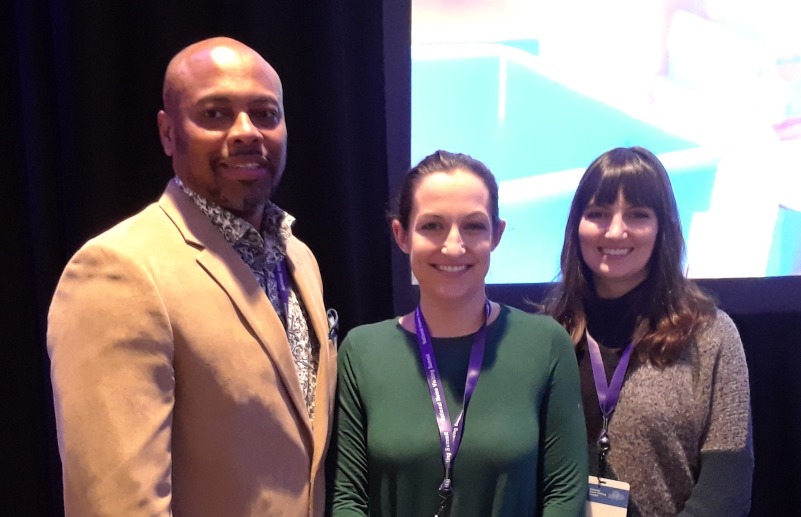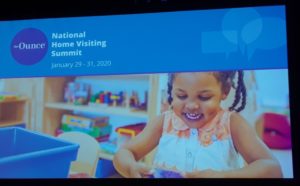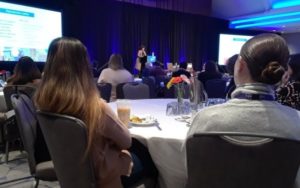The 2020 National Home Visiting Summit took place Jan. 29-31 at the Grand Hyatt in Washington, D.C., where home visiting leaders across the nation gathered to discuss ways to improve child and family outcomes. Neil White, who tells the stories of Children’s Trust, covered the event.

Eric Bellamy, Katrin Bost and Cathy Ramage of the Children’s Trust home visiting team attended the three-day National Home Visiting Summit.
WASHINGTON, D.C. – Alicia Lieberman stood before the 750 attendees at the National Home Visiting Summit and spoke her truth about the important role that home visitors play to improve maternal and child health, prevent child abuse and neglect, and promote child development and school readiness.
“We cannot do effective home visiting without social justice. Home visiting is social justice,” Lieberman said, as loud applause rang throughout the room during her plenary session.
She added that home visitors have to step in where the system has failed and help absorb the trauma of every family they serve.
“I want to honor the work that home visitors do because it’s really being in the trenches in a way that nobody else is,” said Leiberman, Ph.D., a professor and vice chair for faculty development at the University of California, San Francisco department of psychiatry as well as director of the Child Trauma Research Program at Zuckerberg San Francisco General Hospital.
Home visitors – who can be nurses, social workers, or child development specialists – support preventive health and prenatal practices, help parents understand developmental milestones, promote the use of positive parenting techniques, and work with mothers to set goals for the future, continue their education, and find employment and child care solutions. Lieberman spoke to their challenges and their opportunities.

As South Carolina’s lead agency for the Maternal, Infant and Early Childhood Home Visiting (MIECHV) federal grant since 2010, Children’s Trust supports three evidence-based home visiting models – Healthy Families America, Nurse-Family Partnership, and Parents as Teachers – in partnership with 16 implementing agencies in 40 counties.
These voluntary program models serve mothers and young children by providing them with important resources and skills. Children’s Trust helped these sites in South Carolina serve 1,385 families through 17,262 home visits over the past year with funding from the U.S. Health Resources and Services Administration’s Maternal and Child Health Bureau.
Inspired by the Messages of Home Visiting Advocates
Eric Bellamy, Children’s Trust director of program integration, was inspired by Lieberman’s message. He also saluted the words of Joia Crear-Perry, M.D., the founder and president of the National Birth Equity Collaborative and a global maternal health advocate, who discussed social determinants of health through an equity lens and how to bridge the needs of the families being served by home visiting programs.
Crear-Perry stated that home visitors are building a foundation of environment and education for families that need it the most.
“We all have value, and we all deserve to have well-being,” she said.
Those words resonated with Bellamy.
“I appreciated her message about addressing and mitigating social factors,” Bellamy said. “Serving individuals is exactly what MIECHV is designed to do, and I have always strived to holistically serve families this way. We need to continue to help empower our partners to do this and push for systemic change.”
Cathy Ramage, home visiting senior coordinator for Children’s Trust, took note of Lieberman’s message that family support programs and home visitors are asked to address so many different areas with families to promote health and well-being. Yet there remains a need to change the systems that prevent families from being strong because programs cannot address areas such as housing, access to education, and health care.
“There is a limit to what funded programs can do if resources don’t exist locally,” Ramage said. “For me this is a message I hear from our programs in South Carolina more and more.”

The National Home Visiting Summit is hosted by the Ounce of Prevention Fund, a Chicago-based nonprofit organization with a goal that all children living in America, particularly those born into poverty, have quality early childhood experiences in the crucial first five years of life. The event brings together systems leaders, practitioners, advocates and decision makers to advance home visiting as a key component of early childhood systems to improve child and family outcomes.
The summit included visits to Capitol Hill for consultation and strategy sessions with U.S. lawmakers and their staffs, and it offered attendees, who came from 47 states and countries as far-flung as Australia, Brazil and China, a choice of 28 workshops covering a wide variety of topics and featuring a host of expert presenters.
Learning from Peers Across the Country
Bellamy pointed to a session entitled “Help Is at the Door: Communicating Mission, Not Organization” by Early Impact Virginia about an ongoing campaign to help local implementing agencies do stronger outreach to families and help them get better connected to local programs. The camaraderie he felt with those in attendance was an added bonus.
“I always enjoy the time to interact with peers from across the country and national leaders to learn about their innovations and converse candidly,” said Bellamy, who is currently serving a two-year term on the national board of directors for the Association of State and Tribal Home Visiting Initiatives (ASTHVI).
Katrin Bost, home visiting systems coordinator at Children’s Trust, enjoyed having the opportunity to discover the innovative ways that different states are helping families through home visiting.
“Programs in southeastern Pennsylvania are integrating legal aid services into home visiting through a medical legal partnership to identify and address unmet legal needs among families,” Bost said. “North Carolina is developing a comprehensive statewide home visiting system through extensive collaborative planning and systems science. We can learn so much from our peers in other states, and there is no shortage of work to be done.”
Home visitors in attendance echoed this message. One of Children’s Trust MIECHV grantees, MUSC Children’s Health, which implements the Healthy Families America program model in Charleston, Berkeley and Dorchester counties, sent two staff members to the summit.
Leticia Urroz, a family support specialist supervisor with MUSC Children’s Health, came away feeling empowered by what she heard over the three-day conference.
“What gave me hope regarding the future in home visiting programs was the success in implementing more collaborative efforts such as the ones in Washington, D.C., and Rhode Island,” Urroz said. “I love the idea that we need to get together, private organizations and government agencies, to bring more equity to all families.”




